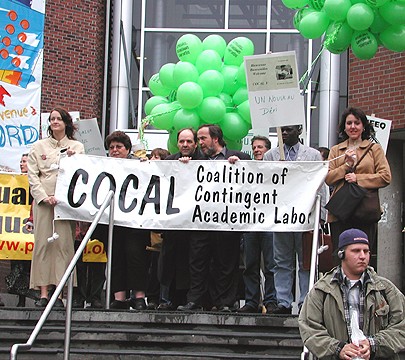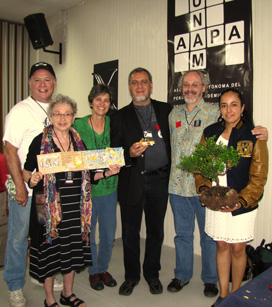About COCAL

Montreal March
(Photo by Vicki Smallman)
The Coalition of Contingent Academic Labor is a network of North American activists working to improve higher education through the collective achievement of job reliability, livable wages, academic freedom, and time and resources for academic research and professional development for contingent academic laborers. COCAL is not affiliated with any single labor union and promotes grassroots contingent faculty organizing through events like Campus Equity Week. To achieve its aims, COCAL dedicates itself to alerting the broader community about the trends that undermine the tenets of higher education by staging media events, improving legislation concerning higher education and so-called accountability efforts, and identifying colleagues at institutions and assisting them in forming collective bargaining units and negotiating strong contracts.
COCAL Governance Policy
Click here for the Governance Policy approved in May 2014 by the International Advisory Committee
COCAL International Advisory Committee
The current members of the International Advisory Committee:

COCAL X
(Photo by David Milroy)
Joe Berry AFT/AAUP/NFM
Mayra Besosa AAUP
Weldon Cowan FPSE
Mary Ellen Goodwin FACCC
Flo Hatcher AAUP
Jonathan Karpf CFA
Curtis Keyes NFM
Maria Teresa Lechuga STUNAM
Sylvain Marois FNEEQ
David Milroy CPFA
Marcia Newfield AFT
Judy Olson NFM
Maria Peluso CUPFA
Alyssa Picard AFT
Arturo Ramos STAUACH
David Rives AFT
Francine Tremblay CUPFA
Kane Faucher
Meeting Minutes
History of COCAL
In December 1996, the first National Congress of Adjunct, Part-time, Graduate Teaching Assistants, and Non-Tenure Track Faculty Conference was held in Washington, D.C. This conference ran concurrent with the Modern Language Association (MLA) conference in D.C. that year, at which the Graduate Student Caucus held a panel (moderated by Eric Marshall) on "Making the MLA More Proactive" in part-time faculty issues. Both the MLA panel and the National Congress conference were well-attended and very successful, attracting people from all over the country.
Vinny Tirelli revived his ADJ-L listserve which continued the discussions that developed during the Washington conference. In April 1998, Vinny Tirelli, Eric Marshall, and others organized the 2nd Annual National Congress conference at the CUNY Graduate Center in New York City. The e-journal, Workplace, was officially launched at the opening session. Cary Nelson & Stanley Aronowitz were keynote speakers.
The group renamed itself "The Coalition of Contingent Academic Labor (COCAL)," and a steering committee was formed. It was decided that the 3rd Annual conference would be held the following year in Boston in April 1999. This conference was hosted by activists from the University of Massachusetts, Boston (UMB) Part-time Faculty Committee of the Faculty-Staff Union (FSU), an affiliate of the National Education Association.
Building on earlier success from 1986, and with state budget surpluses emerging out of the recession of the early seventies, the Part-time Faculty Committee spurred FSU to vigorous support of part-time faculty issues. They achieved major gains in June 1998, including the reclassification of PT faculty teach two sections as salaried half-time employees with full medical, dental, and retirement benefits, and a floor of $4000.00/course. These successes inspired other faculty in the Boston area where there are 58 separate institutions of higher education. However, since most of these colleges had no union, part-time faculty from other colleges began to join with those at UMB, making the April 1999 conference a base for the Boston Project, now in its second year of demonstrating the success of regional coalition. Led by Gary Zabel and other part-time faculty activists, the Boston Project has worked closely with established organizations such as the American Association of University Professors, local affiliates of the National Education Association, the United Auto Workers Union, etc., and a variety of contingent labor support groups.
Faculty leaders of the California Part-time Faculty Association (CPFA), linking with their East coast colleagues through internet listservs and email, met for their Annual Plenary in June 2000 and decided that CPFA successes from building a statewide coalition would be furthered by expanded outreach. The meeting resolved to join the North American Alliance for Fair Employment (NAAFFE), and to host COCAL IV, the first West Coast National Conference on Contingent Academic Labor, in January 2001.
